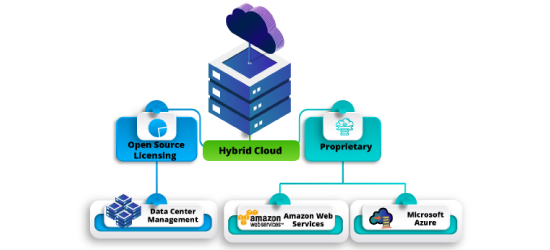Published Date :
In their quest for improved security, agility and performance, more and more organizations are moving to the hybrid cloud.
By design hybrid clouds offer benefits of both public and private cloud/on-premises data centers.
However, there are some challenges in running operations seamlessly. Chiefly, SLAs, visibility into multiple cloud environments, workloads and not least governance and security. These are key areas in successfully managing hybrid clouds. And this calls for in-depth understanding of these areas, over and above the technical factors involved in managing hybrid clouds.
Which is why organizations considering a hybrid cloud must have a transitioning strategy in place, which identifies applications (by priority) by cloud migration-readiness.
Hybrid Advantages
Hybrid cloud prevents vendor lock-in and might reduce hardware costs across platforms.
It facilitates use of containers for deployment of mobile and web applications at scale
Use of virtual machines, which allows software-defined networking and is the core of hybrid cloud management, enables high data security, service continuity, and consistent uptime
Hybrid clouds bring value propositions around data privacy management, security, and regulatory compliance, that make it possible for businesses to mitigate challenges regarding regulations of data residency, while providing high control on data security, and availability.
Disadvantages
Security and compliance become the organization’s responsibility, bringing with it, higher risk of internal data theft
Legacy applications and inefficient firewalls vulnerable to hackers.
Visibility Challenges
The biggest challenges organizations face in managing their hybrid cloud are
lack of visibility & control required for service assurance. These remain major concerns in managing a hybrid cloud, and extend to every stage of the hybrid environment.
Incomplete datasets pose one of the biggest headaches to visibility. Complete datasets are necessary for complete visibility of every layer of their network. to enhance infrastructure-performance and prevent cyberattacks by identifying and mitigating threats pre-emptively
Solutions for Hybrid Cloud Management
Hybrid cloud management solutions can be categorized into open-source licensing and proprietary. Open-source software includes data-center management tools purpose-designed for applications that support large corporations.
Proprietary tools, include the following:
Amazon Web Services
AWS hybrid cloud solutions enable consistency across your cloud and on premises environments. With AWS Outposts organizations get the total experience of managing the differents components of a hybrid cloud, i.e. data centers, on-premises and colocation services, and the cloud itself. Organizations can leverage these to avail encrypted data capabilities with support for security and compliance certifications.
Microsoft Azure
Microsoft offers hybrid cloud solutions (using on-premises Azure Stack and Azure Public Cloud) to improve productivity in application development, and deployment. It also enables complete overisight of security, giving organizations the capabilities to modernize applications. Microsoft Azure also offers hybrid CI/CD through processes and tools across on-premises and cloud environments.
Putting It to Work
Teleglobal is well experiences in delivering AWS and Azure hybrid cloud capabilities. As a long established partner to both AWS and Azure, we have the knowledge base, resource depth and experience to deliver a competitive edge for organizations seeking the best of both worlds for their IT environment. We have successfully helped organizations optimize their enterprise-wide access to data while bridging data gaps using hybrid cloud environments that significantly raised application development, and deployment, and allowed end-customers to reduce platforming efforts for new resources.
Conclusion
For organizations seeking to keep pace with evolving market dynamics, hybrid cloud deployment offers best-of-both-world advantages: higher resilience, higher productivity, and higher performance across workloads. It provides effective data residency and also empowers them to face down security challenges. Different organizations have different requirements in hybrid cloud deployment and management; however, by identifying common implications and considerations, Teleglobal can help you make strategic decisions regarding infrastructure’s use and purpose.
Need help with your cloud?
"No worries! Our experts are here to help you. Just fill the form and we'll get back to you shortly!"
Our Partners


 +919356301699
+919356301699 hello@anetautomation.com
hello@anetautomation.com
